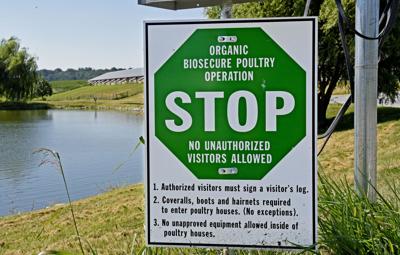Dairy farmers in Lancaster County and across the nation are on alert due to confirmed cases of avian flu jumping from wild birds to cows, but no major impact is expected on milk supply.
Biosecurity efforts are focused on limiting contact between cattle and wild birds. Initial reports do not indicate the virus strain is adapted to transmit from cattle to cattle or from cattle to humans, as reported in today’s Penn State Extension biosecurity webinar featuring an assistant state veterinarian from the Pennsylvania Department of Agriculture.
Pasteurization kills influenza and all milk transported between states is required to be pasteurized, Penn State Extension veterinarian Hayley Springer emphasized.
Consumers and farmers alike should focus on credible sources of information as federal and state officials continue to expand testing of sick cattle, Springer urged.
Four positive tests for avian flu among dairy cattle in Kansas and Texas, reported Monday by the U.S. Department of Agriculture, provide a possible answer to an unknown illness affecting primarily older dairy cattle in Texas, Kansas and New Mexico. The tests came in response to reports of deceased wild birds on farms with sick cattle.
READ: Bird flu, weather and inflation conspire to keep egg prices near historic highs for Easter
READ: Bird flu is decimating seal colonies; Scientists don't know how to stop it
No major effects are expected on milk supply or prices nationwide, as deaths have been rare among cattle affected by the unknown illness and milk loss has been limited, Springer said.
Affected cattle produced abnormal milk that was thick with a yellow to brownish tinge. “Dairies are required to send only milk from healthy animals into processing for human consumption; milk from impacted animals is being diverted or destroyed so that it does not enter the food supply,” the USDA Monday press release states.
The 2022 Census of Agriculture from the U.S. Department of Agriculture, the most up-to-date accounting of industry statistics, shows milk from Lancaster County dairy cows was worth $422.8 million in market value. The census shows the county’s poultry and eggs were worth $774.5 million in market value
The 2022 outbreak of avian flu, more formally known as highly pathogenic avian influenza or HPAI, is ongoing. The first case in the United States in which a human contracted the dominant H5N1 virus strain occurred in April 2022 in a worker who was depopulating an affected poultry farm. The patient recovered after a few days of fatigue, according to reports from the federal Centers for Disease Control and Prevention.
No additional human cases have been recorded in the United States, but more than 82 million poultry in 48 states have been affected, according to a March 2024 CDC website update. USDA data on the 2022 avian flu outbreak shows 4.7 million birds affected in Pennsylvania.
More than 87% of the state’s affected birds were in Lancaster County. CDC data shows the county faced 32 outbreaks, affecting more than 4.1 million birds. Infected flocks were culled and composted.
The USDA Monday press release said the avian flu cases found in cattle remain of minimal risk to humans, stating, “Initial testing by the National Veterinary Services Laboratories has not found changes to the virus that would make it more transmissible to humans, which would indicate that the current risk to the public remains low.”
Springer and assistant state veterinarian Erin Luley encouraged dairy farmers to focus on limiting exposure between cattle and wild birds, as migrating waterfowl have been found to be the biggest risk factor for avian flu transmission.
Luley said there is no current evidence of cow-to-cow transmission, adding that the Pennsylvania Department of Agriculture is working to prepare labs to take samples as they encourage the state’s veterinarians to report suspect cases to an emergency hotline at 717-772-2852.
Avian flu in birds is highly contagious among flocks, and outbreak response protocols put strict movement restrictions in place to regulate areas with affected poultry farms. In March 2023, Lancaster Farming reported that 207 poultry flocks in eastern Lancaster County and western Chester County had been placed under quarantine. The state declared a return to normal poultry trade in August 2023.
Luley said the current cases in cattle don’t have the same trade implications, but added that the state is still developing its response protocol.







